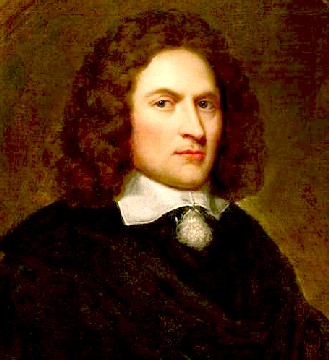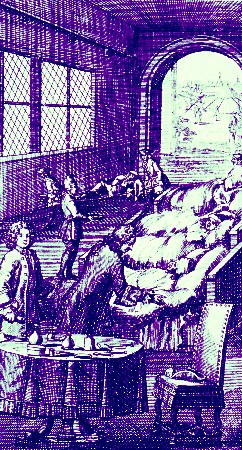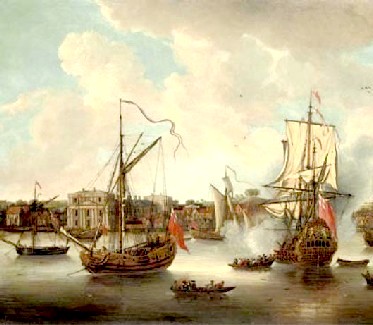
The Politics of Sea Surgery During the GAoP Menu: 1 2 3 4 5 6 7 8 9 Next>>
The Politics of Sea Surgery During the Golden Age of Piracy, Page 4
Macro-Politics: Surgeons on Practical vs. Theoretical Medicine
While some surgeons argued for the creation of a more 'learned' practice, others seemed to suggest that there was no point in trying to make the field more theoretical. Such surgical writers indicated that a purely theoretical stance such as some physicians used was not as valuable as one that incorporated practical experience such as they employed. Still not all of them were comfortable in suggesting that they should have sole control over the treatment of the patient. In fact, most surgical authors deferred to some degree to the knowledge of the physicians in their writings.
Famed military surgeon Richard Wiseman is one of the more deferential surgical authors from the 
Author Richard Wiseman period. For a man with swollen legs, Wiseman explains how he washed the mans legs, "It being allowed of by the Physician"1. He asks for physician assistance in treating several other cases including syphilis2, an ulcerated wound of the temple3, the removal of tubercles from an ulcer4, and in a wound of the breast5. He also recommended to some patients who consulted him that they would be better advised to see a physician.6
However Wiseman sometimes took such treatment into his own hands. He explained when treating an inflamed tumor that since he was "left alone to act without a Physician, I let him [the patient] bloud in the other Arm, and prescrib’d a Clyster and Cordial Julep... also an Anodyne [pain-relieving] draught to dispose him to rest that night; which he did better than he had done many nights before."7 He also suggested to his readers that internal cordial medicines were good for fainting, "which for want of a Physician you may prescribe."8
In another of his books, Wiseman comes out more strongly for the value of practical medicine, using an analogy to slyly suggest that 'learned' physicians were not always the best qualified to treat illnesses:
In all which I doubt not but the farther he [a surgeon] goeth on in practice, the more of clearness and plainness he will find; and the whose so much better performed than a meer Academick could have done it, without being a Practitioner himself, as a Traveller can describe a Country to one that is taking a journey into it more sensibly and usefully, than one that hath only read of it and seen it in Maps.9
Sea surgeon John Woodall also suggests deferring to the physicians to a degree as previously mentioned. He explains when discussing the need for advice from physicians, "it is expedient and just, where learned counsel may bee had, to make use of it, for that by much counsel there is safety". 
From
Chirurgische observations , By
A,
Huetter Funffzig (1718) However, immediately after saying that, he goes on, "it is uncharitable to forbid an expert Surgeon at any time, or in any place, the use of the instruments and medicines which are necessary to his art, for the curing of his patient"10. He adds
whether he be called Physician, Surgeon or Leech, or what other name men please to impose upon him, if they admit, yea and appoint him to cure wounds, tumors against nature, ulcers, erisipalaes [an acute skin infection], herpes, the French Pox, the pestilence, or whatsoever other disease is incident to mans body, it is but fitting that hee be free to have the proper use of all medicines and instruments11
Woodall likewise recommends that the surgeon be allowed to recommend the best course of diet for a patient, something traditionally left to the physicians. He cites the revered ancient medical authors when justifying his stance.
Wherefore I conceive him to bee no just and charitable judge, that denyeth this instrument, namely dyet, to belong to a Chirurgion as well as to a Physician: for, that reason and experience both doe allow and approve thereof... all arts are grounded upon experience and reason: if any one can declare, either by experience or reason, a way how to cure ulcers, tumors, wounds, fistulaes and other like diseases incident to mans body, as the French Pox, the Plague, &c. the cures which diseases by statute lawes are appointed to Surgeons, and to doe it without the use of dyet, and other both inward and outward helps, which these learned men (as Hippocrates and Galen) used, and have no small labour found out by reason and experience12
Not surprisingly, fellow sea surgeon John Atkins had similar thoughts on the value of the surgeon's practical experience, stating that "Physick, as it relates to Surgery, being, in my Opinion, neither so very ample nor mysterious"13. He further opines that while "Anatomy teaches what Part is hurt... [and] Physick instructs how the Symptoms peculiar to any are excited... still Experience seems superior to both; or, more properly, Physick bottomed on Experience."14 He goes on to say "that my Reasoning and Theory herein, comes after the Trial to confirm, or rather amuse the Understanding, both as to the Manner of Production, and Choice of Remedy; which is now this, now that, just as Humour and Fashion alters"15. He concludes his Preface decisively, stating, "For let the Knowledge of Nature be never so extensive, that is best which can be justified from Facts; and it is the particular Case here, added to what we have seen of the like Kind before, that best directs our Judgment in Choice of Remedy, and Process for Relief."16
1 Richard Wiseman, Of Wounds, Severall Chirurgicall Treatises, 1686, p. 85; 2 Wiseman, Of Wounds..., p 525; 3 Wiseman, Of Wounds..., p 387; 4 Wiseman, Of Wounds..., p 93; 5 Wiseman, Of Wounds..., p 369; 6 Wiseman, Of Wounds..., p 53; 7 Wiseman, Of Wounds..., p 19; 8 Wiseman, Of Wounds..., p 11; 9 Richard Wiseman, "The Epistle", Eight Chirurgicall Treatises, 3rd Edition, 1696, not paginated, 2nd page; 10,11 John Woodall, "Preface", the surgions mate, 1639, not paginated, 7th page; 12 Woodall, "Preface", 5th page; 13 John Atkins, “Preface”, The Navy Surgeon, 1734, p. vi; 14 Atkins, “Preface”, p. vii; 15 Atkins, “Preface”, p. viii; 16 Atkins, “Preface”, p. x
Macro-Politics: The Navy on Practical vs. Theoretical Medicine
While the English navy wanted surgeons on board to prevent the loss of men, they also wanted the healing process to be as fast and easy as possible so that their surgeons could quickly get the sick and wounded 
Artist: Isaac Sailmaker
A Flagship Arriving at Greenwich Hospital (late17th/early18th c.)
back to work on behalf of the Crown. Historian Harold Cook explains that "the admirals and generals to whom the practitioners were responsible welcomed medical practices that could be communicated according to clear and uniform rules that promised quick, cheap, easily administered, and efficacious cures to get their troops back on their feet."1 He adds, "The simpler the rules and therapies, and the more certain the outcome, the better."2
Many of the surgeons who went to sea were newly trained, lacking experience. On top of this, "Military medical practitioners were often only cursorily trained in medical practice."3 Surgeon's mates and assistants who went to sea and were being trained shipboard sometimes found themselves being summarily promoted to the rank of full surgeon after only a few years when their teacher succumbed to illnesses or wounds. This was because there was no one else as well qualified to assume the role while the ship was at sea.
It was due to such problems with effective training that "military surgeons needed to learn as quickly as possible the basic rules about what to do when confronting a particular problem, not the fine art of exercising medical judgement."4 Because they dealt with so many men at a time and were under pressure by their boss to get men back to work, ship and military surgeons had little time for lengthy, individualized treatments of the type that physicians usually undertook. As a result, "military practitioners sometimes had a more 'practical' orientation towards medicine than their civilian counterparts: they little needed to impress their captive patients with their reasoning, while they had to get on with their burdensome job as simply as possible."5
1 Harold J Cook, "Practical Medicine and the British Armed Forces After the 'Glorious Revolution," Medical History, p. 14-5; 2 Cook, p. 2; 3,4,5 Cook, p. 15

